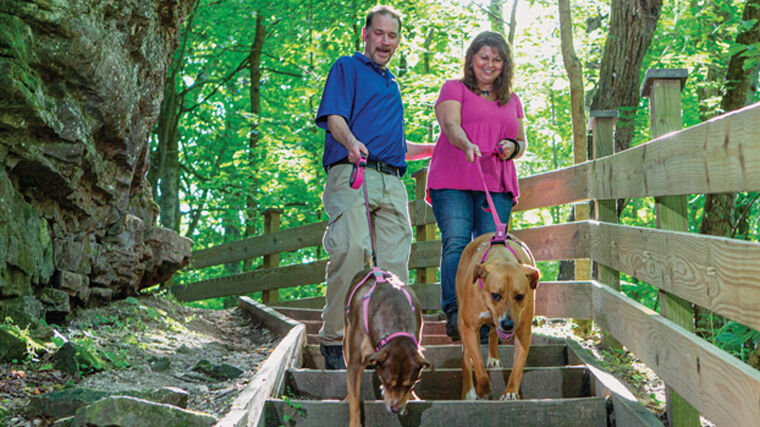Diane's Story: Overcoming Fear

Delaying medical treatment because she was afraid of Coronavirus could have cost Diane Hartman her life.
The little things in life make a big impact on Diane Hartman. The 50-year-old mother of three from Tipp City made the best out of being quarantined during the coronavirus pandemic. What started as a typical Friday night, enjoying pizza and a movie with family, took a quick turn that could have cost Diane her life.
“I started having a little heartburn,” says Diane. “I really didn’t think anything of it.”
Her symptoms began getting worse and she started experiencing chest pain, numbness in her left arm and trouble sleeping. In fear of going to the emergency department, and the possibility of contracting COVID-19, Diane weighed
her options.
She decided it was time to get help but wanted advice before making the trip to the hospital. She made a call to her health insurance company and was connected to a medical professional who advised her to seek care right away.
“He said, ‘Ma’am, you’re going to die of a heart attack if you don’t go to the hospital,’” says Diane. “He told me that he believed I either had a heart attack or I
was in the middle of having a heart
attack.”
A Dangerous Downward Trend
An April study in the Journal of the American College of Cardiology found admissions for STEMI, a serious type of heart attack, dropped 38 percent after March 1, 2020. In April, Premier Health also saw a significant decline in people seeking treatment for both strokes and severe heart events.
In disbelief that she likely suffered a heart attack, Diane was torn. Encouraged by her husband, she decided it was time to go to Miami Valley Hospital’s Emergency Department.
“I thought the symptoms of a heart attack were like something you’d see on TV or in the movies – someone in extreme pain dropping to the ground or grabbing their chest,” says Diane. “It wasn’t that.”
Diane was seen by Joseph Mauro, MD, emergency department medical director at Miami Valley Hospital. It was discovered that she had a significant obstruction in her left anterior descending artery.
 “What she had is also known as the widow maker,” explained Dr. Mauro. “She could’ve potentially died, lost a significant portion of her cardiac function, or been dependent on medications and a pacemaker/defibrillator for the rest
of her life.”
“What she had is also known as the widow maker,” explained Dr. Mauro. “She could’ve potentially died, lost a significant portion of her cardiac function, or been dependent on medications and a pacemaker/defibrillator for the rest
of her life.”
The next day, a cardiac stent was placed to increase Diane’s blood flow to her heart. After three days of observation, Diane was released from the hospital.
“I was so pleased that I made the decision to come to the hospital and be treated.”
Keeping Patients Safe During a Pandemic
Premier Health recognized early on that the impact of the coronavirus pandemic would make it necessary to change the experience of visiting the hospital. The health system’s emergency departments were, and still are, well-prepared to care for people with emergent health care needs in addition to COVID-19.
“Premier Health was proactive and pulled our teams together at each hospital, so that we were ready,” explains Marc Belcastro, DO, system chief medical officer for Premier Health. “We leveraged all our clinical experts, across the health system, to work around the clock to ensure we were able to take care of our community.”
At all Premier Health sites, safety measures are in place to protect against the spread of COVID-19 and to put the well-being of patients and staff first, which includes visitor restrictions.
“It was hard to be in the hospital by myself, but I understood,” says Diane. “I would’ve liked for my family to visit, but with modern technology we were still able to connect and be in touch.”
Diane says she has quite a few more years left, and she’s not done yet. “My son is getting married next year, someday there’s going to be grandchildren – I want to be part of that, healthy and able to run around and play.”
Contact Us
Premier Health’s infectious disease specialists provide services throughout Southwest Ohio. Please let us know how we can serve you. Find a provider near you or consult our list of related practices.
Our infectious disease specialists are affiliated with:

